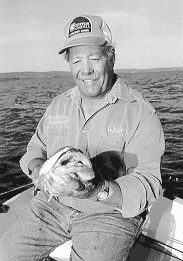
Your fishing foundation consists of three areas: approach, attitude, and enjoyment. These three areas are all of equal importance. They must be addressed and strengthened in order to support and organize the large amounts of information available to anglers today. Without a strong foundation, your questions and the answers to them remain as individual pieces to a puzzle.
Approach
Fishing is very easy to over-think. Keep it simple. Approach each problem, no matter how complex it may seem, with the attitude that there are always simple solutions. Keeping fishing simple can be one of the most difficult things to do. With the real facts and information intertwined with advertising and myths, recognizing these true, simple facts can be a major challenge.
Separating facts from advertising, myths, and information designed only to sell products is simple. You must approach each piece of fishing information armed with one fact: fish don't think or make decisions. Fish react to an action. Understanding this, fishing can become quite simple, and the information that can make a real difference becomes quite clear.
Attitude
The identification of a truly good fisherman is his smile. A smile is your ticket to fishing success. Twenty years ago, you couldn't pass another boat without a wave or a smile, and a friendly, "Hello." You couldn't walk past another fisherman along the bank without getting a smile and a, "How they biting?"
Today, you could call a smiling fisherman an endangered species. Most fishermen don't smile or say, "Hello." They act as though they are the only one on the lake, even though they are in a pack of boats. This is a sad commentary because there's only one thing that can make you a better fisherman, and that's communication. Communication is the sharing of experience and information and is the key to fishing success.
You, as a fisherman, don't have enough fishing days in your lifetime to do all the things that could be and should be done on your favorite lakes, let alone tackling new waters. If you smile, it will open communications and allow knowledge to flow. Join a fishing club, attend a fishing seminar or fish a tournament. These are the things that will make you a better fisherman. Remember: It all begins with a smile.
Enjoyment
Enjoyment is another part of your fishing foundation that must be considered and worked at. Enjoyment and fun don't automatically come with fishing. On the contrary, a fishing trip can at times be a great deal of work and little or no fun. Just ask your wife. Fishing today has changed dramatically from what it was 20 years ago. Fishing today is too often squeezed into busy schedules, taking something we should enjoy and savor and compressing it into something closer to work than fun. Fishing trips today are high- tech, with all the expensive equipment and the bells and whistles that go with it. Too often time is condensed and restricted. This leaves us without any fun or relaxation, but instead with frustration and a family who hopes they never hear the word "fishing" again!
Today's fishing trips leave much to be desired, as they are generally scheduled to fit into a particular time slot. "We've got to get there by 6:00 A.M. because I have to be back by 3:00 P.M." This means a quick stop for bait (maybe some snacks and ice if you're not in too big a hurry), launch the boat, hit your first hot spot, then the next, and so on. When a fish is eventually caught, it's admired briefly and then quickly tossed back into the water because you don't have enough time to clean it anyway. Soon, the time is up and it's back to the ramp you go. You load the boat and head for home arriving in time for supper. Then at supper, rather than a recap of all the fun you had, you say to your son, "Don't forget to clean the boat." And we wonder why kids don't like to fish anymore!
Twenty years ago fishing was an event that involved the entire family. Planning started about mid-week with deciding where to go. Bait shops were called along with fishing buddies to find where the hot bite "was happening." Kids made sure the grass was mowed and the trash was taken out, being sure not to leave any obstacles that could derail their fishing plans.
Bait gathering was an event, not just something bought along the way to the lake. Snacks weren't bought or picked up at the drive-through along the way. Mom packed the lunch the night before. Fishing was always for the day or until you were done, no time limits. Most of the fish that were caught were kept, and even though they may not have been the biggest, Dad sure acted like it. Dark was the only time we knew to be home, but it was always later than that. First, a stop had to be made at Grandpa's, then Uncle Bill's, showing off the catch-of-the-day. Once home the duties weren't cleaning the boat, but to clean the fish and listen to Mom tell us how she was going to fix the catch for supper. These weren't just fishing trips, but fishing events involving the entire family.
How does involving your whole family make you a better fisherman? Simple: you can go fishing more frequently. The more you fish, the more you catch, and the more you catch the better you become, and the more fun you have. These are the three simple things I consider your fishing foundation: approach, attitude, and enjoyment. Strengthen this foundation and the pieces to the puzzle will fit together.





